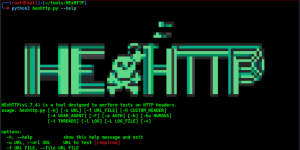Offensive Security Tool: linWinPwn

Reading Time: 4 Minutes
linWinPwn
linWinPwn is a bash script written by lefayjey that automates several Active Directory Enumeration and Vulnerability checks. The script uses several tools such as: impacket, bloodhound, crackmapexec, ldapdomaindump, lsassy, smbmap, kerbrute, adidnsdump, certipy, and others. Red Teams find this tool particularly useful when you have access to an Active Directory environment for a limited time only and wish to automate the enumeration process and efficiently collect evidence. In addition, linWinPwn can replace the use of enumeration tools on Windows to reduce the number of created artifacts and bypass certain Anti-Virus or EDRs. This can be achieved by performing remote dynamic port forwarding through the creation of an SSH tunnel from the Windows host (e.g., VDI machine or workstation or laptop) to a remote Linux machine (e.g., Pentest laptop or VPS), and running linWinPwn with proxychains.
On the Windows host, run using PowerShell:
ssh kali@<linux_machine> -R 1080 -NCqf
![]()
proxychains ./linWinPwn.sh -t <Domain_Controller_IP>
See Also: So you want to be a hacker?
Complete Offensive Security and Ethical Hacking Course
Setup
Git clone the repository and make the script executable
git clone https://github.com/lefayjey/linWinPwn
cd linWinPwn; chmod +x linWinPwn.sh
Install requirements on Kali machines using the install.sh script
chmod +x install.sh
sudo ./install.sh
On non-Kali machines, run the install_nonkali.sh script instead
chmod +x install_nonkali.sh
sudo ./install_nonkali.sh
If you’re having DNS issues or time sync errors, run the configure.sh script with -d for DNS update and -n for NTP sync
![]()
chmod +x configure.sh
sudo ./configure.sh -t -d -n
Trending: Offensive Security Tool: Mangle
Trending: Recon Tool: Maigret
Usage
Modules
The linWinPwn script contains 6 modules that can be used either separately or simultaneously.
Default: interactive – Open interactive menu to run checks separately
./linWinPwn.sh -t <Domain_Controller_IP> [-d <AD_domain> -u <AD_user> -p <AD_password_or_hash[LM:NT]_or_kerbticket[./krb5cc_ticket]> -o <output_dir>]
User modules: ad_enum,kerberos,scan_shares,vuln_checks,mssql_enum
./linWinPwn.sh -t <Domain_Controller_IP> [-d <AD_domain> -u <AD_user> -p <AD_password_or_hash[LM:NT]_or_kerbticket[./krb5cc_ticket]> -o <output_dir>] -M userAll modules: ad_enum,kerberos,scan_shares,vuln_checks,mssql_enum,pwd_dump
./linWinPwn.sh -t <Domain_Controller_IP> [-d <AD_domain> -u <AD_user> -p <AD_password_or_hash[LM:NT]_or_kerbticket[./krb5cc_ticket]> -o <output_dir>] -M allModule ad_enum: Active Directory Enumeration
./linWinPwn.sh -t <Domain_Controller_IP> [-d <AD_domain> -u <AD_user> -p <AD_password_or_hash[LM:NT]_or_kerbticket[./krb5cc_ticket]> -o <output_dir>] -M ad_enumModule kerberos: Kerberos Based Attacks
./linWinPwn.sh -t <Domain_Controller_IP> [-d <AD_domain> -u <AD_user> -p <AD_password_or_hash[LM:NT]_or_kerbticket[./krb5cc_ticket]> -o <output_dir>] -M kerberosModule scan_shares: Network Shares Scan
./linWinPwn.sh -t <Domain_Controller_IP> [-d <AD_domain> -u <AD_user> -p <AD_password_or_hash[LM:NT]_or_kerbticket[./krb5cc_ticket]> -o <output_dir>] -M scan_sharesModule vuln_checks: Vulnerability Checks
./linWinPwn.sh -t <Domain_Controller_IP> [-d <AD_domain> -u <AD_user> -p <AD_password_or_hash[LM:NT]_or_kerbticket[./krb5cc_ticket]> -o <output_dir>] -M vuln_checksModule mssql_enum: MSSQL Enumeration
./linWinPwn.sh -t <Domain_Controller_IP> [-d <AD_domain> -u <AD_user> -p <AD_password_or_hash[LM:NT]_or_kerbticket[./krb5cc_ticket]> -o <output_dir>] -M mssql_enumModule pwd_dump: Password Dump
./linWinPwn.sh -t <Domain_Controller_IP> [-d <AD_domain> -u <AD_user> -p <AD_password_or_hash[LM:NT]_or_kerbticket[./krb5cc_ticket]> -o <output_dir>] -M pwd_dumpDemos
- HackTheBox Forest
Interactive Mode:
Automated Mode:
- TryHackme AttacktiveDirectory
Use cases
For each of the cases described, the linWinPwn script performs different checks as shown below.
Case 1: Unauthenticated
- Module ad_enum
- rid bruteforce
- user enumeration
- ldapdomaindump anonymous enumeration
- Check if ldap-signing is enforced, check for LDAP Relay
- Module kerberos
- kerbrute user spray
- ASREPRoast using collected list of users (and cracking hashes using john-the-ripper and the rockyou wordlist)
- Blind Kerberoast
- CVE-2022-33679 exploit
- Module scan_shares
- SMB shares anonymous enumeration on identified servers
- Module vuln_checks
- Enumeration for WebDav, dfscoerce, shadowcoerce and Spooler services on identified servers
- Check for ms17-010, zerologon, petitpotam, nopac, smb-sigining, ntlmv1, runasppl weaknesses
./linWinPwn.sh -t <Domain_Controller_IP_or_Target_Domain> -M user
Case 2: Standard Account (using password, NTLM hash or Kerberos ticket)
- DNS extraction using adidnsdump
- Module ad_enum
- BloodHound data collection
- ldapdomaindump enumeration
- crackmapexec user=pass enumeration
- Delegation information extraction
- GPP Passwords extraction
- Extract ADCS information using certipy
- Check if ldap-signing is enforced, check for LDAP Relay
- Extraction of MachineAccountQuota of user, Password Policy and users’ descriptions containing “pass”
- Module kerberos
- kerbrute user=pass enumeration
- ASREPRoasting (and cracking hashes using john-the-ripper and the rockyou wordlist)
- Kerberoasting (and cracking hashes using john-the-ripper and the rockyou wordlist)
- Module scan_shares
- SMB shares enumeration on all domain servers
- KeePass files and processes discovery on all domain servers
- Module vuln_checks
- Enumeration for WebDav, dfscoerce, shadowcoerce and Spooler services on all domain servers
- Check for ms17-010, zerologon, petitpotam, nopac, smb-sigining, ntlmv1, runasppl weaknesses
- Module mssql_enum
- Check mssql privilege escalation paths
./linWinPwn.sh -t <Domain_Controller_IP_or_Target_Domain> -d <AD_domain> -u <AD_user> -p <AD_password_or_hash[LM:NT]_or_kerbticket[./krb5cc_ticket]> -M user
Case 3: Administrator Account (using password, NTLM hash or Kerberos ticket)
- All of the “Standard User” checks
- Module pwd_dump
- LAPS and gMSA dump
- secretsdump on all domain servers
- Dump lsass on all domain servers using: procdump, lsassy, nanodump, handlekatz, masky
- Extract backup keys using DonPAPI
./linWinPwn.sh -t <Domain_Controller_IP_or_Target_Domain> -d <AD_domain> -u <AD_user> -p <AD_password_or_hash[LM:NT]_or_kerbticket[./krb5cc_ticket]> -M allDisclaimer:
Usage of linWinPwn for attacking targets without prior mutual consent is illegal. It’s the end user’s responsibility to obey all applicable local, state and federal laws. Developers assume no liability and are not responsible for any misuse or damage caused by this program. Only use for educational purposes.
Clone the repo from here: GitHub Link









